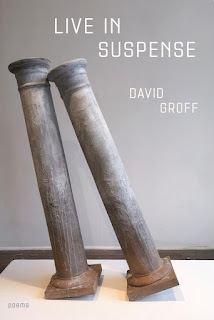David Groff is the author of the new poetry collection Live in Suspense. He also has written the poetry collection Clay. He teaches in the MFA creative writing program of the City University of New York.
Q: Over how long a period did you write the poems in your new collection?
A: My previous book, Clay, came out in 2013, and as my new poems accrued, I had to figure out what they were saying, not just individually but as a book. I had to live into them, live them out, see how they spoke to each other, discover where they were leading me. That all took some nine years (yikes!).
Q: How was the book’s title--also the title of the first poem--chosen, and what does it signify for you?
A: The title came into out of an experience that I write about in another poem in the book, called simply “Suspense.”
I was having dinner with a friend, and I realized he was about to reveal something significant and serious, something I sensed would alter our bond, maybe change my life. I could tell from his face that he was just a few breaths away from those momentous words, even though I didn’t know what they would be. Those in-between breaths felt vital in themselves.
Here's the end of the poem: “This restaurant is wrestling voices./This espresso is getting cold./I listen to your eyes./I live in suspense.”
This moment of in-betweenness seemed like one we find ourselves living through often, as we wait for the next mortal thing to happen. This suspension seemed like what a lot of the poems are about. I hope the title works as both a statement and an imperative, a tension and an embrace.
From that poem came the title for the book’s first poem, which is about my husband Clay and the possibility of calamity that makes our life together (or when we’re apart) even more present and precious: “every risk is a rehearsal.”
Q: The poet Mark Wunderlich said of the book, “David Groff's Live in Suspense is a book of retrospection and asks readers to consider the interstices that is a life lived between losses.” What do you think of that description, and what do you hope readers take away from the collection?
A: I’m really grateful for Mark’s words. He’s a poet deeply attuned to the presence of the past.
I guess I have a working belief that every poem is an elegy, an attempt to reclaim a person, a moment, a feeling, that might otherwise not be crystalized.
In the book there are a lot of actual elegies for my father, an Episcopal priest whose faith, complex character, and sensibility have even more impact on me now that he's gone. And I’ve found my late mother, also a complex presence, taking on a new role. In the poem “Like a Simile,” she appears as a possible spirit-guide, showing how we might leave life without feeling lonely.
Also in the book are a number of “Days of” poems, each one with a year attached (“Days of 1980,” “Days of 1985,” etc.) that revisit the famous homoerotic poems of retrospection by Constantine Cavafy. I wanted to see how his eye and heart might inform the love and loss of our own time.
I hope readers will feel sustained by this collection, that they’ll find the poems approachable and resonant, and worth rereading!
Q: How did you decide on the order in which the poems would appear in the collection?
A: When I advise my students on their MFA thesis poetry collections, we try to find a metaphor for the book’s structure. Is it a journey, an argument, a gallery, a garden?
With Live in Suspense, I wanted readers to follow a path that would be rocky at first as they encounter the book’s conflicts, and then move into something of an underworld from which they emerge—as in the poem “Grievance,” which begins, “Where did you go, grief?”—into a grove of reconciliation.
The final poems step into a more tranquil place, with some pleased acceptance, as in the poem “Snow Melting,” where I suggest that we can “be the disappearing/into the disappearing.”
Q: What are you working on now?
A: After the hard work of making a book, I just want to play on the page and see where that play takes me. I want to write poems that are fun to look at and fun on the tongue—poems that might even rhyme. I’m also working with memoir, seeing how poetic language might manifest on the prose page. With any luck, I’ll find myself stepping sideways into a new, longer work.
Q: Anything else we should know?
A: Like a lot of readers, I tense up at the sight of a poem. We can feel we need a magic decoder ring to get its meaning right. I think that if we approach a poem—whether it’s mine or someone else’s—simply with curiosity, we can find ourselves engaged and intrigued. Also, it’s great to read poems aloud, to lead with the breath.
--Interview with Deborah Kalb


No comments:
Post a Comment